Saving bees, and getting others to love them too
Clarence Chua’s The Sundowner is shaking up Singapore’s bee extermination scene, changing the way people view bees
THE amber Siglap shophouse that houses nature experience centre The Sundowner buzzes with activity, especially on weekends, from pizza-making to cocktails-mixing, open-air movie screenings and terrarium-making. And at its rooftop farm – close encounters with earthworms, ants and bees.
It is that last insect – the bee – that started it all and remains the centre of what they do, says beekeeper Clarence Chua, founder of The Sundowner.
“Many businesses start with a big business idea and then try to incrementally go green after that, tokenistically,” says Chua. The decision to launch a rocket into space and the lifetimes of carbon that would expend, for instance, cannot be “greened” by sustainable manufacturing of a small part.
“For us, sustainability came before the business. I wanted to save the bees first. Then, the business ideas, creating our rooftop farm experiences, those flowed from that.” His aim is for these to spread a love of nature and bees.“It’s a different way to think about it. That if you do something green, something right and needed, and charge along with it, people will be attracted to it,” says the 39-year-old.
He himself stumbled into bee rescue. A client of his previous landscaping business – since sold off – needed a beehive removed. Chua decided to do it himself, rather than use pest exterminators.
“Bees aren’t pests. They are pollinators, and so vital, even in a city like Singapore,” says Chua. A mature colony of 30,000 Asian honey bees can pollinate 50 million flowers a day, adding to greenery and vegetation, and reducing the urban island heat effect.
Navigate Asia in
a new global order
Get the insights delivered to your inbox.
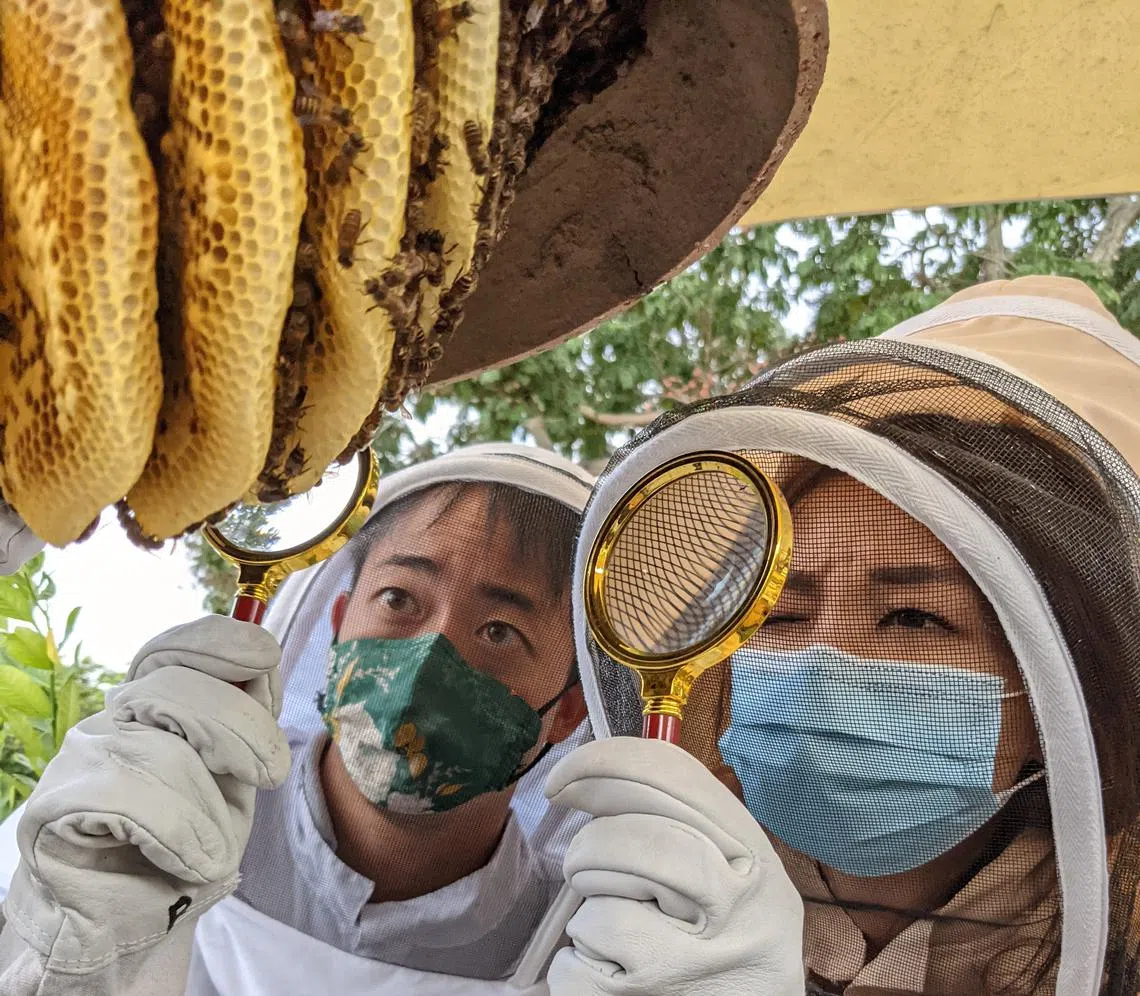
Chua believes they are pivotal to forest health too, pollinating flowers that bear fruit. Could shrinking forests, or a lack of food in the forests, be why more wild boars and monkeys are now harassing residents in built-up areas, he wonders.
Though that first colony of bees flew away, Chua started teaching himself – online and by trial and error – how to rescue and keep bees. He soon realised the need to charge for labour-intensive relocations. “But bee rescue was never going to put food on my table, hence the rooftop farm experiences,” he says.
Back in 2020, he rented a shophouse unit to safely house the landscaping firm’s migrant workers, instead of the dormitories which were seeing surges in Covid-19 cases and being locked down.
The bonus empty rooftop that came with it was first used as a rooftop garden showcase for his landscaping clients, but soon transformed into a farm lush with herbs, coffee plants, and more, as well as an apiary. That apiary has doubled in size since, and Sundowner now has two others.
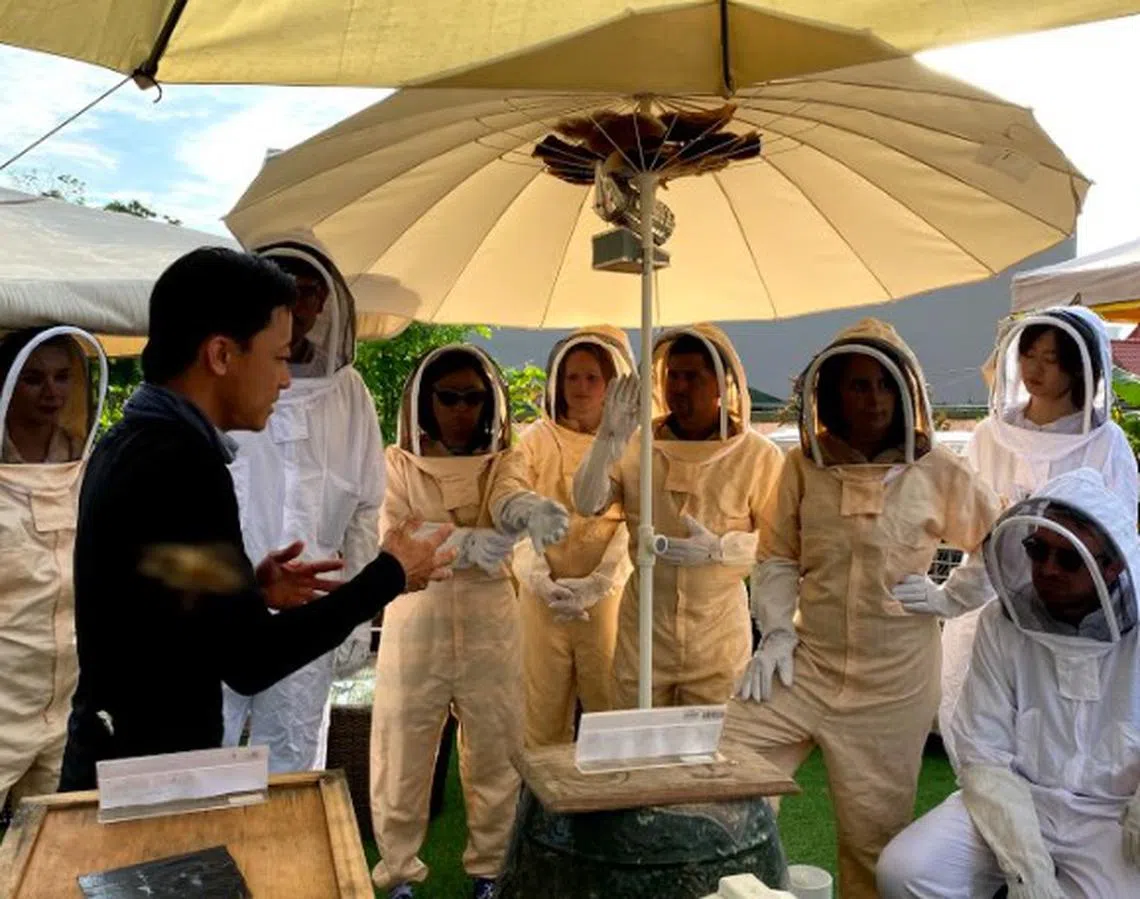
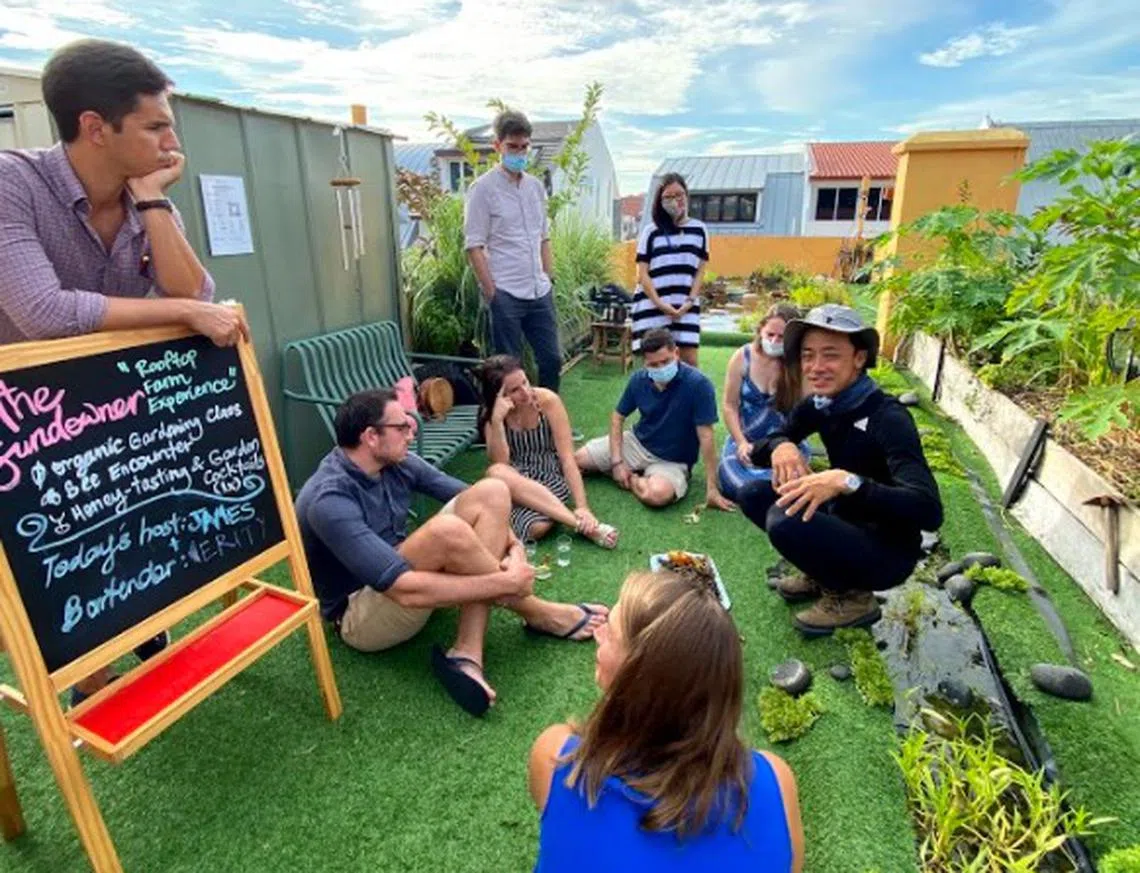
His passion project drew other passionate freelancers, including an engineer who helped design the vacuum box device they use to rescue bees, and another who buys his own honey as gifts for bee rescue clients to share about the wonder of bees with them.
Surprise sponsorship
It also drew an unexpected influx of funds.
A news feature on The Sundowner caught the eye of German charitable institute Stiftunglife, which was disbursing funds on behalf of global logistics company Kuehne+Nagel.
Their sponsorship of US$10,000 in late 2021 gave Chua firepower to proactively approach pest control companies with a reasonable proposition.
He would bill half his usual fee, offering the pest control companies a referral fee if they could offer his bee nest relocation services to clients who wanted hives removed. It worked.
Chua is quick to say he is not Singapore’s first bee rescuer – he is in fact the newest and youngest of Singapore’s three professional beekeepers. But he is certain that no pest control company ever relocated a single bee back in 2019.
“Armed with just our passion and insistence, and a sponsorship from someone who believed in our work, we have single-handedly changed that scene in three years,” he says.
The Sundowner now partners several pest control companies, including Temasek-linked Anticimex and Killem Pest. It is a win for them too; the larger ones compile bee nest relocation statistics for their sustainability reports, Chua says.
The Ang Mo Kio and Jurong-Clementi town councils have since “joined the movement”, contracting the three beekeepers in town to rehouse wild bees that would previously have been fumigated.
The Sundowner carried out 88 bee rescues in 2022 – almost triple the 30 done in 2021. This year’s total has already outstripped that, with 95 colonies rescued.
“We’ve saved more than 200 colonies so far, so that’s a million pollinators saved,” he says. That is based on a conservative estimate of 6,000 bees a colony; mature Asian honey bee colonies are 30,000 strong.
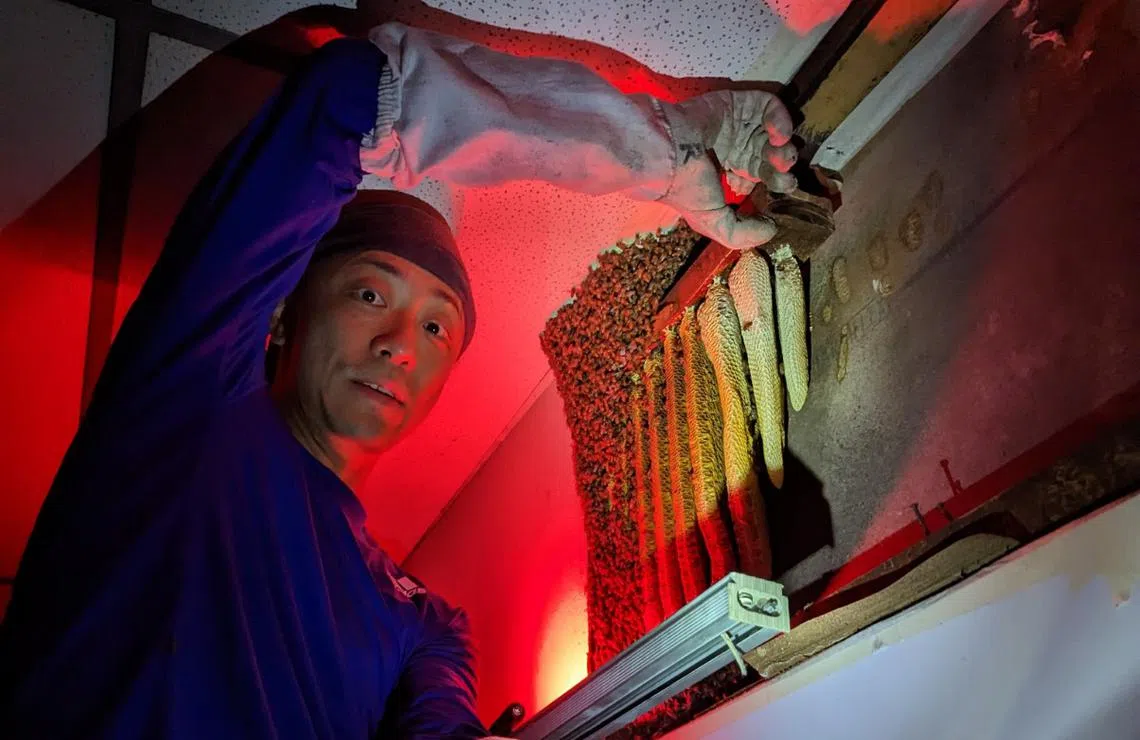
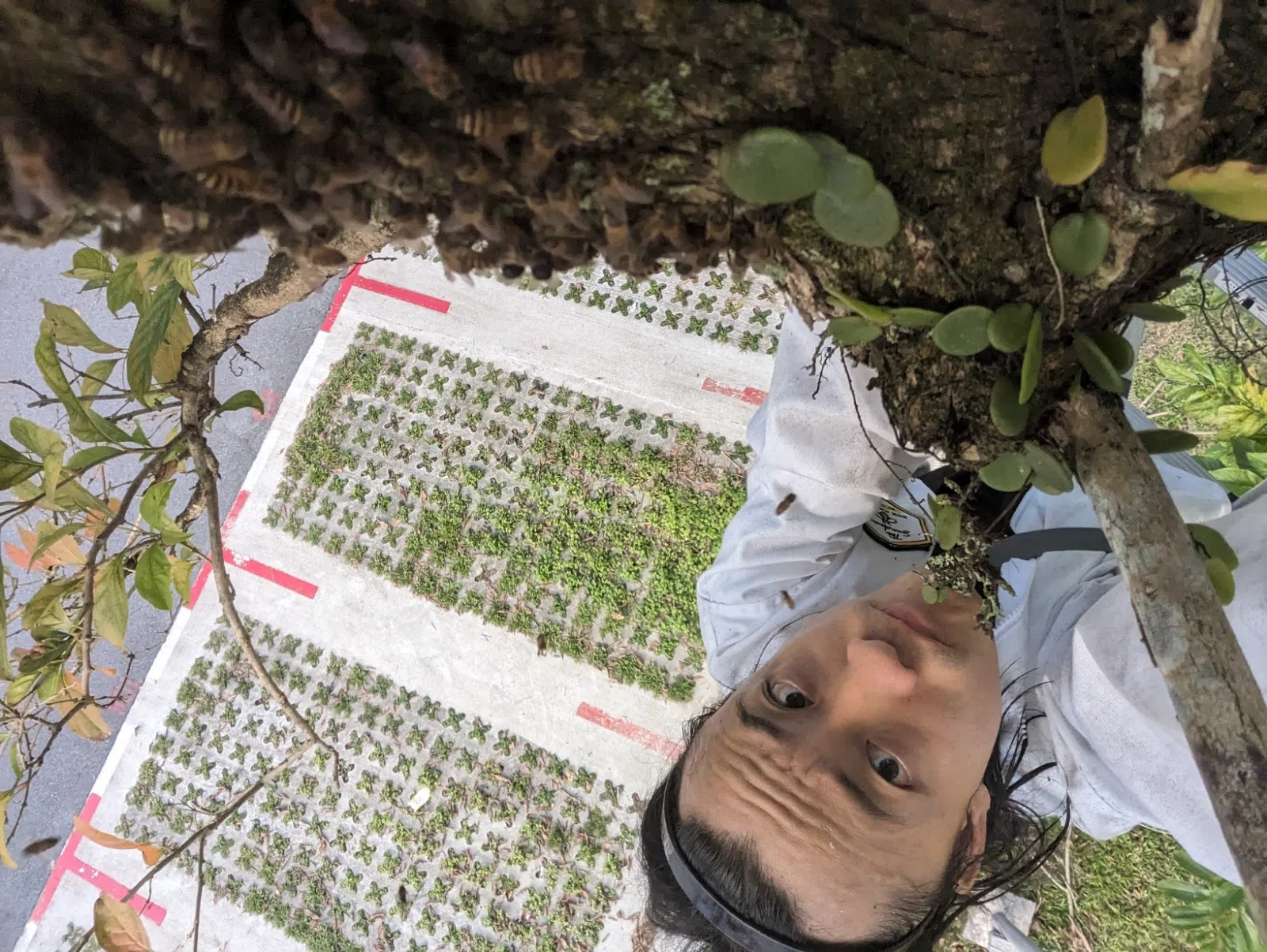
“Important or not? I think so. If we turned the story around and someone says he’s going to set out to destroy a million butterflies – he would be public enemy number one.”
In any case, results produced by The Sundowner’s not-for-profit bee rescue arm, The Sundowner Bee Rescue, were good enough to secure them another US$13,500 in sponsorship directly from Stiftunglife.
“We plan to keep going indefinitely, given enough demand and sponsor support,” Chua says.
Another unexpected boon was an invitation to partner French beauty group Guerlain, which has the bee as its emblem and is an active supporter of bee conservation work globally.
Chua has conducted workshops for Guerlain and its guests on Singapore’s indigenous bee populations and run tasting sessions of wild “Ang Mo Kio honey” harvested from combs rescued from Housing and Development Board estates.
For championing the cause of bees in Singapore, he picked up an Excellence Award in the Individual category at the Sustainability Impact Awards 2023.
One challenge to further expansion is finding more bee rescuers.
Currently, Chua and his wife run their home business – which pulled in an income of S$550,000 in FY2022, up from S$215,000 in FY2021 – with a lean team of eight freelancers who work on both bee rescues and the rooftop farm experiences.
“We run our bee rescue programme not for glory or profit, but out of a passion for nature. We climb trees three storeys high, hang off roofs, and toil under noontime sun and midnight moon, to rescue every bee colony we can,” Chua says. It is not for most.
He is also in search of a larger bee-friendly space for educational outreach events, as the current rooftop can only host a maximum of 30, limiting their ability to engage larger groups from companies.
Chua, who has two children aged three and six, says, “Everyone wants our kids to inherit not such a bad world – I think our world is irreversibly dying. I don’t go around doing bee rescues thinking I’m saving the world, I’m not so heroic, but at least I’m doing my small bit.”
Not unlike the humble honey bee.
Decoding Asia newsletter: your guide to navigating Asia in a new global order. Sign up here to get Decoding Asia newsletter. Delivered to your inbox. Free.
Copyright SPH Media. All rights reserved.




